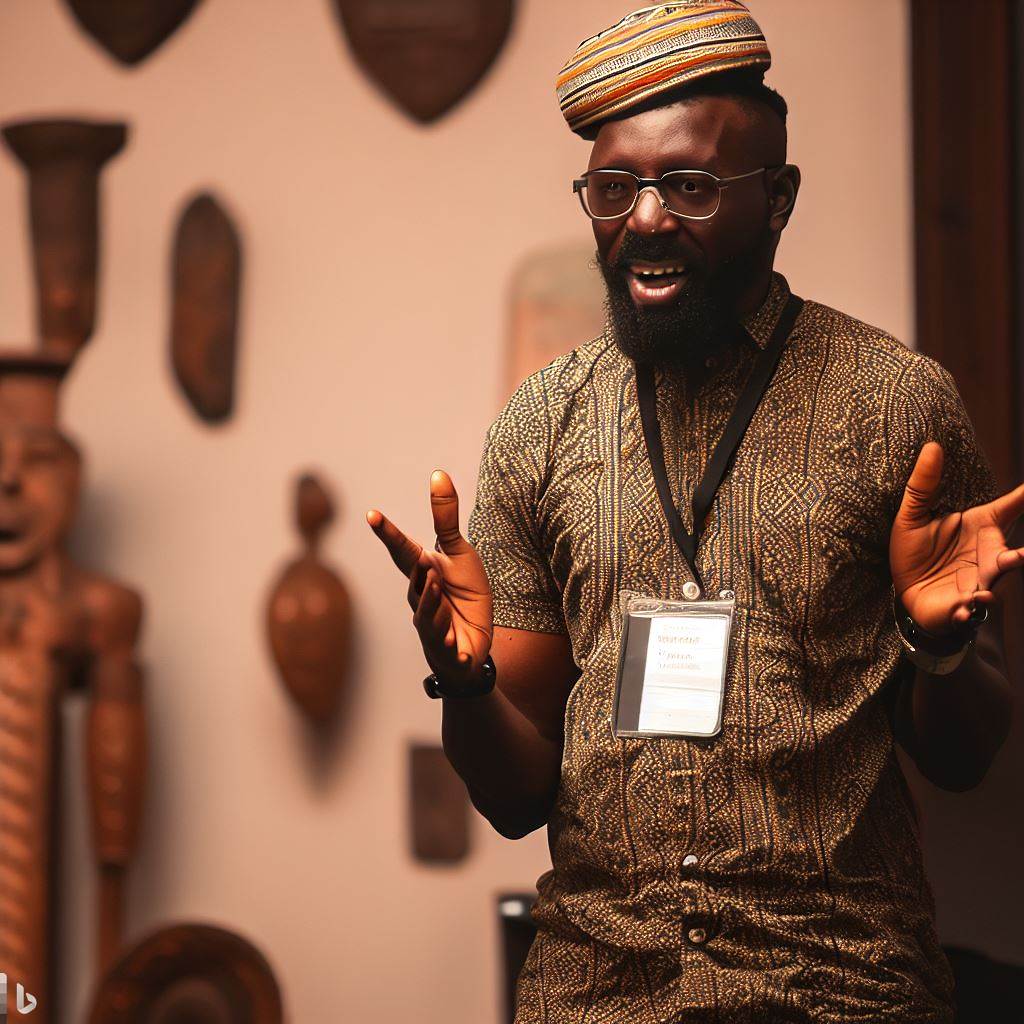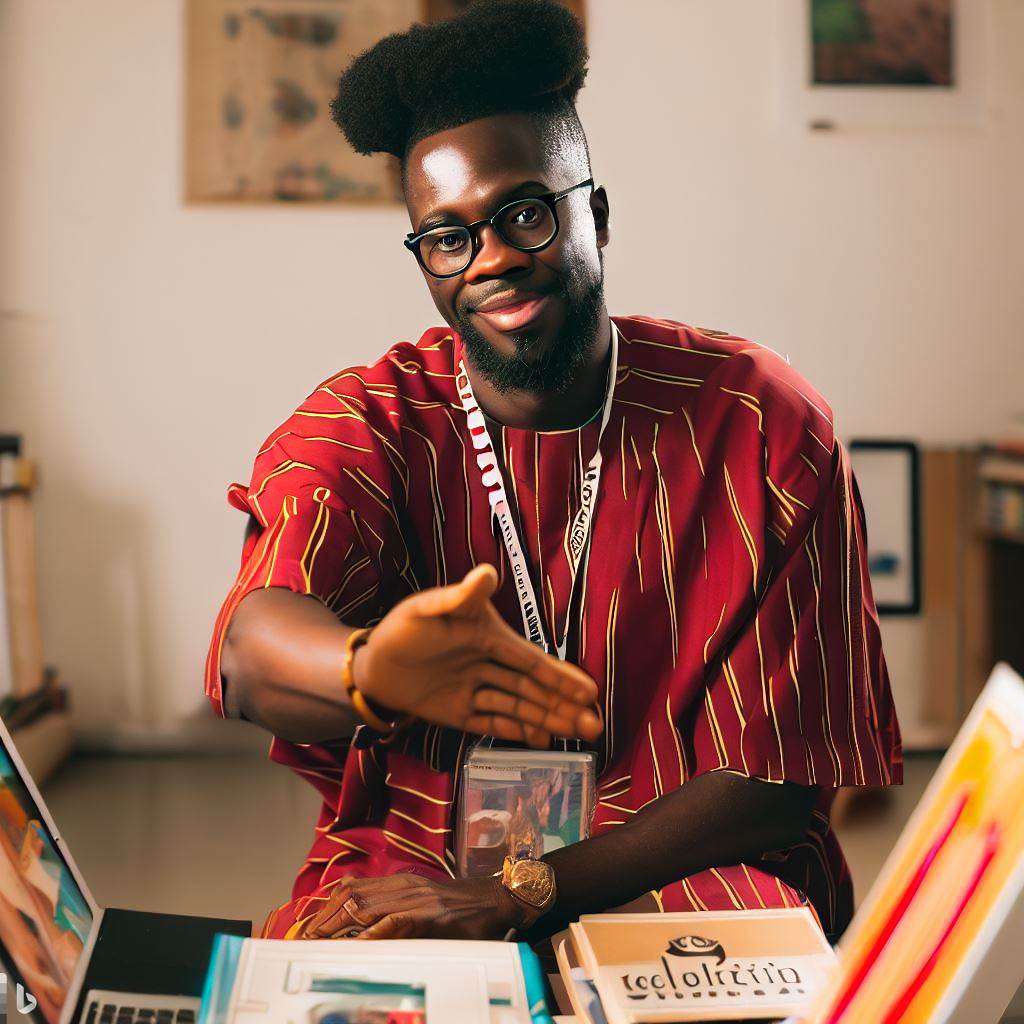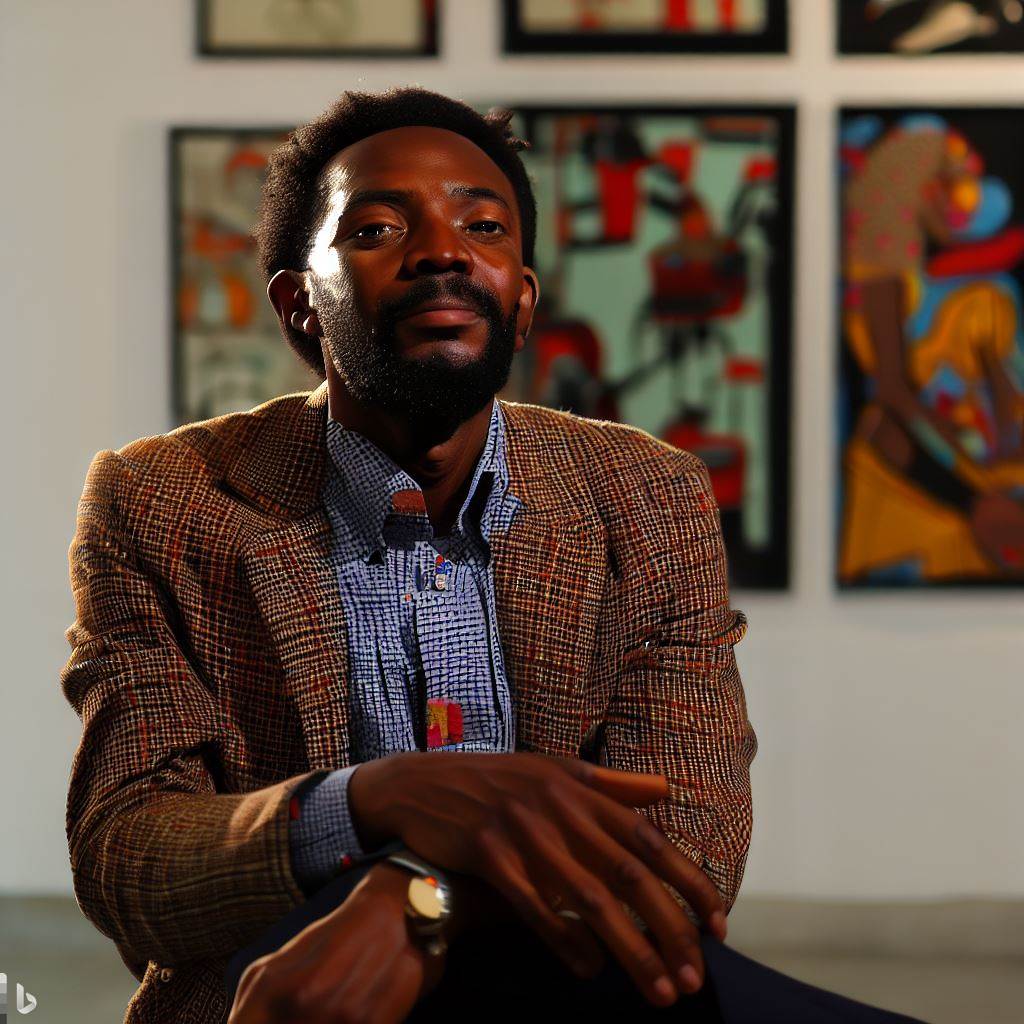Introduction
A. The impact of curators on Nigeria’s cultural heritage
Curators are vital for the preservation and promotion of Nigeria’s cultural heritage. Their role cannot be overstated and Curators Impact on Nigeria Cultural Heritage is essential
Nigeria is blessed with a rich cultural heritage, which includes diverse traditional arts, languages, music, dances, and historical artifacts.
However, without the careful intervention and expertise of curators, this heritage would be at risk of gradual erosion.
Curators are experts in the field of cultural heritage management.
They are responsible for the identification, documentation, conservation, and interpretation of cultural artifacts and traditions.
Their main objective is to ensure that Nigeria’s cultural heritage is preserved for future generations and promoted to a wider audience.
The impact of curators on Nigeria’s cultural heritage is manifold. Firstly, they play a crucial role in safeguarding and protecting cultural artifacts from physical damage, theft, and decay.
Through proper storage, handling, and display techniques, curators ensure that these treasures remain intact and accessible to the public.
B. General overview of why curators play a significant role in preserving and promoting cultural heritage
Secondly, curators actively engage with communities and individuals to obtain valuable insights and knowledge about the cultural context of artifacts and traditions.
This collaborative approach helps in understanding the significance and meaning behind various cultural practices, adding layers of depth and richness to the interpretation.
Furthermore, curators curate exhibitions and educational programs to showcase Nigeria’s cultural heritage to the world.
By organizing events and disseminating information, they enhance public awareness and appreciation for the diverse cultural traditions that make Nigeria unique.
Curators have a significant impact on Nigeria’s cultural heritage by preserving, promoting, and interpreting the country’s rich cultural diversity.
Their expertise and dedication ensure that future generations can continue to learn and benefit from Nigeria’s vibrant heritage.
Historical Background
A. The historical importance of Nigeria’s cultural heritage
- Nigeria’s cultural heritage holds immense historical importance.
- Nigeria, with its diverse ethnic groups, has a rich cultural identity.
- Colonial rule had a significant impact on Nigeria’s cultural heritage.
- The Benin Bronzes and Nok Terracottas are notable examples of Nigeria’s cultural heritage.
- The Igbo-Ukwu bronze works are testament to Nigeria’s ancient civilization.
- Nigeria’s cultural heritage also includes traditional music, dance, and storytelling.
- The Biafra war had a profound impact on Nigeria’s cultural identity.
- Independence in 1960 marked a turning point in preserving and celebrating Nigeria’s heritage.
- Today, Nigeria takes pride in its cultural diversity and heritage.
- The Nigerian government recognizes the importance of preserving cultural heritage.
B. Significant Events Shaping Nigeria’s Cultural Identity
- The colonization by the British Empire from the late 19th century.
- The emergence of nationalist movements in the early 20th century.
- The Nigerian Civil War, also known as the Biafra war, from 1967-1970.
- The establishment of the National Museum in Lagos in 1957.
- The return of the Benin Bronzes from the British museums in recent years.
- The UNESCO recognition of Osun-Osogbo Sacred Grove as a World Heritage Site in 2005.
C. The Role of Curators in Understanding and Preserving Nigeria’s Cultural Heritage
- Curators play a crucial role in researching and documenting Nigeria’s cultural heritage.
- They strive to understand the historical and cultural significance of artifacts and artworks.
- Curators collaborate with local communities to ensure the preservation of living cultural heritage.
- They curate exhibitions that showcase Nigeria’s cultural heritage to both local and international audiences.
- Curators educate the public about the importance of preserving cultural heritage.
- They actively engage in the conservation and restoration of artifacts and artworks.
- Curators contribute to the ongoing dialogue surrounding cultural identity and heritage in Nigeria.
- They work with scholars and researchers to further our understanding of Nigeria’s cultural heritage.
- Curators also advocate for the repatriation of looted cultural artifacts to Nigeria.
- Their work helps to strengthen national pride and promote cultural tourism in Nigeria.
The Role of Curators
Curators play a crucial role in preserving and safeguarding Nigeria’s rich cultural heritage.
Their responsibilities and tasks encompass various aspects of researching, cataloging, and preserving cultural artifacts.
A. Defining the Role of a Curator
A curator can be regarded as a guardian of Nigeria’s cultural heritage, entrusted with the task of preserving and promoting it.
The role of a curator involves extensive research, documentation, and conservation of cultural artifacts that depict the country’s historical and cultural significance.
B. Responsibilities and Tasks of Curators
Curators perform a wide range of responsibilities and tasks to ensure the preservation and promotion of Nigeria’s cultural heritage:
- Research: Curators conduct in-depth research to understand the historical context and significance of cultural artifacts.
- Cataloging: Curators meticulously catalog each artifact, ensuring accurate documentation of their origin, history, and cultural significance.
- Preservation: Curators employ specialized techniques and methods to preserve cultural artifacts, protecting them from environmental degradation and decay.
- Exhibition Planning: Curators play a key role in designing and curating exhibitions, showcasing Nigeria’s cultural heritage to the public.
- Interpretation: Curators provide insightful interpretations and narratives that help visitors understand and appreciate the cultural artifacts.
- Collaboration: Curators collaborate with experts, archaeologists, historians, and communities to ensure accurate interpretation and representation.
- Education and Outreach: Curators develop educational programs and outreach initiatives to raise awareness and engage the public with Nigeria’s cultural heritage.
- Conservation: Curators employ measures to conserve and protect cultural artifacts from deterioration, such as climate control and restoration.
- Digitization: Curators digitize cultural artifacts, making them accessible to a wider audience and ensuring their long-term preservation.
- Community Engagement: Curators actively engage with local communities, fostering a sense of ownership and pride in preserving their cultural heritage.
C. The Importance of Curators
Curators play a vital role in safeguarding Nigeria’s cultural heritage and ensuring its accessibility for present and future generations.
Their crucial contributions can be summarized as follows:
- Preserving Identity: Curators protect and preserve cultural artifacts that reflect Nigeria’s unique identity and diverse cultural heritage.
- Educational Value: Curators facilitate educational experiences by providing historical and cultural context, contributing to a deeper understanding of Nigeria’s heritage.
- Research and Scholarship: Curators contribute to academic research and scholarship by conducting studies and publishing materials related to Nigeria’s cultural heritage.
- Tourism and Economic Impact: Curators enhance Nigeria’s tourism industry by promoting cultural heritage, attracting visitors, and generating economic opportunities.
- Community Empowerment: Curators actively involve local communities, empowering them to contribute and benefit from the preservation of their cultural heritage.
Curators play a vital role in preserving Nigeria’s cultural heritage by engaging in extensive research, cataloging artifacts, and ensuring their preservation.
Their work is of great importance in promoting the country’s unique identity, enhancing education, fostering research, and contributing to tourism and community empowerment.
Read: Training for Customer Service Careers in Nigeria: A Guide
Preservation Efforts
A. Initiatives and projects implemented by curators to preserve Nigeria’s cultural heritage
Curators spearhead diverse initiatives to preserve Nigeria’s cultural heritage. Conservation efforts safeguard delicate artifacts.
Digitization projects archive knowledge.
Outreach programs educate and engage communities. Collaborations with indigenous groups ensure authenticity.
Restoration projects revive historical sites. Exhibitions and publications disseminate knowledge. International partnerships promote cross-cultural exchange.
Education and training programs develop future curators.
These initiatives collectively contribute to the preservation and celebration of Nigeria’s rich cultural heritage, ensuring its endurance for generations to come.
B. Examples of museums, galleries, or institutions that have played a significant role in preservation
The preservation of Nigeria’s cultural heritage is crucial for maintaining its identity and rich history.
- National Commission for Museums and Monuments (NCMM):The NCMM is a government agency responsible for the preservation and management of Nigeria’s cultural heritage.
- National Museum, Lagos: This museum is one of the oldest and most prominent in Nigeria, housing a vast collection of artifacts that showcase the country’s diverse cultural heritage.
- National Museum, Benin City: Located in Edo State, this museum is renowned for its extensive collection of Bronze castings, which depict the historical, cultural, and artistic achievements of the Benin Kingdom.
- Nigerian National Museum, Jos: Situated in Plateau State, this museum showcases the cultural heritage of Nigeria’s diverse ethnic groups.
- National Gallery of Art: The National Gallery of Art in Abuja is dedicated to promoting and preserving contemporary Nigerian art.
- Yaba College of Technology Gallery: This gallery, located in Lagos, plays a vital role in promoting Nigerian contemporary art.
- Restoration of Ancient Artifacts: Curators actively engage in restoration projects to conserve and revive damaged or deteriorated artifacts.
- Preservation of Traditional Crafts: In addition to preserving artifacts, curators also focus on safeguarding traditional crafting techniques.
- Digital Preservation Initiatives: Curators recognize the importance of embracing digital technologies in preserving Nigeria’s cultural heritage.
- Oral History Documentation: Curators work closely with communities across Nigeria to document and preserve oral histories, which are an integral part of the country’s cultural heritage.
- Community Engagement Programs: Curators understand the significance of involving local communities in preserving their cultural heritage.
- Collaboration with International Institutions: Curators collaborate with international museums and institutions to ensure the exchange of knowledge, expertise, and best practices in cultural heritage preservation.
The diligent efforts of curators in Nigeria have played a crucial role in preserving Nigeria’s cultural heritage.
Read: Nigeria’s Top Art Curators: A Look at Their Careers
Promotion and Public Engagement
A. How curators contribute to promoting Nigeria’s cultural heritage
Curators play a crucial role in promoting Nigeria’s cultural heritage through various strategies.
- Exhibitions: Curators organize exhibitions showcasing cultural artifacts to raise awareness and educate the public about Nigeria’s rich cultural history.
- Collaborations: They collaborate with artists and scholars to curate exhibitions that present Nigeria’s cultural heritage in a contemporary and engaging manner.
- Outreach Programs: Curators develop outreach programs to engage diverse communities, schools, and organizations to ensure wider access and appreciation of Nigeria’s cultural artifacts.
- Digital Platforms: Advancing technology empowers curators to share Nigeria’s cultural artifacts, enabling a global audience to explore heritage through online platforms.
- Publications: Curators release catalogs, research papers, and books, offering profound insights into Nigerian culture, enabling a deeper understanding.
- Cultural Festivals: Curators organize cultural festivals and events that celebrate Nigeria’s rich heritage, attracting a larger audience and fostering a sense of pride among Nigerians.
- Collaborative Initiatives: They collaborate with other museums and cultural institutions globally to promote cultural exchange, showcasing Nigeria’s heritage in international exhibitions.
- Educational Programs: Curators develop educational programs for schools and universities, offering guided tours and workshops to enhance understanding and appreciation of Nigeria’s cultural heritage.
- Social Media Campaigns: Curators utilize social media platforms to create awareness about Nigeria’s cultural heritage, sharing stories, anecdotes, and photographs to engage a wider audience.
- Inclusive Interpretation: Curators consider diverse perspectives and experiences, ensuring cultural artifacts resonate with various audiences.
- Public Lectures: They organize public lectures and panel discussions with experts to create dialogue and foster a deeper understanding of Nigeria’s cultural heritage.
- Community Involvement: Curators involve local communities in the preservation and promotion of cultural artifacts, fostering a sense of ownership and pride in their heritage.
B. Strategies used to engage the public and raise awareness about cultural artifacts
Engaging the public and raising awareness about cultural artifacts requires innovative strategies. Museums host interactive exhibits, captivating visitors.
Social media platforms showcase artifacts, reaching a global audience. Educational programs, workshops, and guided tours foster understanding.
Collaborations with schools create future enthusiasts. Online databases enable virtual exploration. Community events and cultural festivals celebrate heritage.
Don’t underestimate the power of storytelling, connecting artifacts with people’s lives. Ultimately, transparency and accessibility build trust and appreciation.
Curators actively promote Nigeria’s cultural heritage, engaging the public, creating awareness, and fostering a profound appreciation for cultural artifacts.
C. Programs, exhibitions, and events organized by curators to share the nation’s cultural richness with a wider audience
Curators initiate diverse programs, exhibitions, and events to share the nation’s cultural richness with a wider audience.
Thematic exhibitions showcase specific aspects of heritage. Interactive displays engage visitors, fostering appreciation.
Lecture series and workshops educate and inspire. Cultural festivals celebrate traditions, drawing crowds. Collaborations with schools bring students into the fold.
Digital platforms extend reach globally. Guided tours offer immersive experiences. Open-access archives facilitate research. Community partnerships integrate cultural richness into daily life.
These initiatives ensure the nation’s heritage resonates with a broad and diverse audience, preserving its significance for future generations.
Read: Becoming a Museum Curator in Nigeria: A Step-by-Step Guide

Economic Impact
A. The economic benefits that curators bring to Nigeria’s cultural heritage
Curators, as custodians of Nigeria’s cultural heritage, play a crucial role in not only preserving the nation’s rich history but also generating significant economic benefits.
Through their expertise and efforts, curators contribute to the overall development and growth of Nigeria’s economy.
Curators Impact on Nigeria Cultural Heritage is worth looking into?
B. The potential for tourism and revenue generation through the promotion of cultural artifacts
1. Preservation of Cultural Artifacts
Curators are responsible for the preservation and conservation of cultural artifacts, ensuring their longevity and availability for future generations.
This preservation effort enhances Nigeria’s cultural heritage, making it a valuable asset for the country.
2. Tourism and Revenue Generation
One significant economic benefit curators bring to Nigeria’s cultural heritage is the potential for tourism and revenue generation.
Curated exhibitions and displays attract tourists both domestically and internationally, who are eager to learn about Nigeria’s history, traditions, and artistic expressions.
This influx of visitors creates opportunities for revenue generation, benefiting local businesses and boosting the economy.
3. Job Creation and Skills Development
The presence of curators in Nigeria’s cultural heritage sector also contributes to job creation and skills development.
Curators are trained professionals who possess a deep understanding of art, history, and cultural practices.
By employing curators, museums, galleries, and cultural institutions generate employment opportunities for individuals skilled in curating and managing collections.
This creates a multiplier effect as additional jobs are created indirectly, such as in hospitality, transportation, and retail industries.
C. How the presence of curators can positively influence the local economy
1. Boost to Local Economy
The presence of curators positively influences the local economy through various means.
Firstly, curated exhibitions and cultural events attract both local and international visitors, resulting in increased footfall in the area.
This benefits local businesses, such as hotels, restaurants, shops, and transportation services, as tourists spend money on these services.
2. International Collaboration and Investment
Curators, as experts in their field, often collaborate with international institutions and participate in global exhibitions and conferences.
This collaboration not only promotes Nigeria’s cultural heritage on an international platform but also attracts investments from the global art community.
International collaborations can lead to funding opportunities, knowledge exchange, and partnerships that contribute to the growth of Nigeria’s cultural sector.
These investments can boost infrastructure development, support research and documentation, and enhance the overall quality of Nigeria’s cultural heritage offerings.
Curators have a profound economic impact on Nigeria’s cultural heritage. Curators Impact on Nigeria Cultural Heritage is essential
Their efforts in preserving and promoting cultural artifacts contribute to revenue generation, job creation, skills development, and collaboration with international partners.
The presence of curators enhances the local economy and cements Nigeria’s position as a custodian of rich cultural heritage.
Read: The Role of Curators in Nigeria’s Growing Art Scene
Challenges Faced by Curators
A. The challenges and obstacles faced by curators in their preservation efforts
- Funding: Curators often face financial challenges that hinder their preservation efforts.
- Lack of resources: Limited access to necessary tools and materials can impede curators’ work.
- Looting of artifacts: Curators constantly battle against the illegal trade and theft of cultural artifacts.
- Inadequate storage facilities: Curators struggle to find appropriate spaces to store and protect valuable artifacts.
- Fragmented collections: Many artifacts are scattered across different locations, making preservation and management difficult.
- Insufficient staff: A shortage of trained personnel affects the efficiency and effectiveness of curators’ work.
- Political instability: Unstable political environments can negatively impact cultural heritage preservation efforts.
- Lack of public awareness: Limited public knowledge and interest in cultural heritage pose challenges for curators.
- Inadequate legislation: Weak laws and regulations fail to provide curators with necessary legal frameworks for protection.
- Environmental factors: Natural disasters or poor environmental conditions can damage or destroy artifacts.
B. To overcome these challenges several strategies and potential solutions can be implemented
- Seeking alternative funding sources: Curators can explore partnerships, grants, and sponsorships to secure financial support.
- Advocacy and education: Raising awareness about the importance of cultural heritage preservation among the public and policymakers.
- International collaboration: Engaging with international organizations and museums to enhance knowledge sharing and resource allocation.
- Improved security measures: Implementing advanced security systems to protect artifacts from looting and theft.
- Museum partnerships: Collaborating with museums worldwide to facilitate the safekeeping and display of artifacts.
- Digital preservation: Utilizing technology to digitize artifacts and create virtual collections for wider accessibility.
- Capacity building: Providing training and education programs to enhance the skills of curators and museum staff.
- Community involvement: Encouraging local communities to actively participate in the preservation and promotion of their cultural heritage.
- Advocating for stronger legislation: Working towards the development and enforcement of comprehensive laws for artifact protection.
- Climate control measures: Ensuring appropriate environmental conditions to prevent damage caused by climate factors.
Conclusion
Curators play a crucial role in preserving and promoting Nigeria’s rich cultural heritage.
Through their efforts, valuable artifacts and traditions are safeguarded for future generations to appreciate and learn from.
The significance of curators in preserving and promoting Nigeria’s cultural heritage
Moreover, curators serve as guardians of Nigeria’s cultural identity and national pride. Curators Impact on Nigeria Cultural Heritage is important
They ensure that the nation’s diverse heritage is celebrated and respected both locally and internationally.
The work of curators goes beyond just preserving artifacts; they also strive to educate the public about Nigeria’s cultural riches. Curators Impact on Nigeria Cultural Heritage is essential
Curators breathe life into Nigeria’s heritage through exhibitions, events, and research, instilling pride and deepening appreciation for its history.
The role of curators in maintaining cultural identity and national pride
It is essential for society to support and appreciate the valuable work of curators in Nigeria. Curators Impact on Nigeria Cultural Heritage is essential.
Without their dedication, many aspects of Nigeria’s cultural heritage would be lost or forgotten. Curators Impact on Nigeria Cultural Heritage is essential.
By visiting museums, attending cultural events, and supporting initiatives aimed at preserving and promoting Nigeria’s cultural heritage, individuals can contribute to the preservation of this invaluable legacy.
The valuable work of curators
Curators are custodians of Nigeria’s cultural wealth, ensuring that it is not only conserved for future generations but also celebrated and understood in the present.
By recognizing and applauding their efforts, we can encourage a stronger appreciation for Nigeria’s diverse heritage, fostering a stronger sense of national pride and identity.
Let us support and celebrate curators as they continue to preserve and promote Nigeria’s cultural heritage for generations to come.




